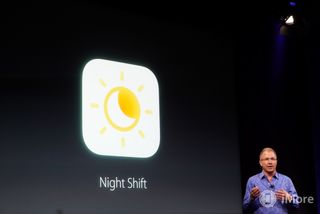Study shows Apple's Night Shift might not actually help people sleep better

What you need to know
- Apple's Night Shift mode is designed to cut down on blue light to improve our sleep.
- A new study suggests that Night Shift might not do much, if anything, to help sleep.
A new study looking into how blue light from smartphones affects our sleep suggests that Apple's Night Shift future might not actually help at all.
Night Shift was first introduced as part of the iOS 9 update and is designed to make iPhone screens warmer during the evening. That cuts down on the amount of blue light emitted by the devices which, in turn, is supposed to help with sleep. However, a new study from BYU and published in Sleep Health suggests that Night Shift might not do what it was intended to.
To test the efficacy of Night Shift, BYU psychology professor Chad Jensen and researchers from the Cincinnati Children's Hospital Medical Center compared the quality of sleep of people who did and did not use Night Shift when using their smartphone. A third group of people didn't use their devices at all.
Participants were randomly assigned to one of three conditions specifying iPhone use during the hour preceding bedtime for seven consecutive nights: iPhone use with Night Shift enabled; iPhone use with Night Shift disabled; and no phone use.
The results showed that the three different groups of people all had the same quality of sleep, with Night Shift having no impact at all. In fact, the only way to get better quality sleep was to not use a device regardless of Night Shift.
Across our full study sample, there were no differences in sleep outcomes attributable to Night Shift. For individuals who regularly obtained adequate sleep, abstaining from screen use resulted in better quality sleep than did phone use with Night Shift enabled.
This isn't the first time that the impact of blue light on sleep has been questioned with the University of Manchester having already found that it isn't as disruptive to sleep as first thought.
Keen to track your own sleep quality? These are the best sleep trackers and monitors on the market right now.
Master your iPhone in minutes
iMore offers spot-on advice and guidance from our team of experts, with decades of Apple device experience to lean on. Learn more with iMore!

Oliver Haslam has written about Apple and the wider technology business for more than a decade with bylines on How-To Geek, PC Mag, iDownloadBlog, and many more. He has also been published in print for Macworld, including cover stories. At iMore, Oliver is involved in daily news coverage and, not being short of opinions, has been known to 'explain' those thoughts in more detail, too. Having grown up using PCs and spending far too much money on graphics card and flashy RAM, Oliver switched to the Mac with a G5 iMac and hasn't looked back. Since then he's seen the growth of the smartphone world, backed by iPhone, and new product categories come and go. Current expertise includes iOS, macOS, streaming services, and pretty much anything that has a battery or plugs into a wall. Oliver also covers mobile gaming for iMore, with Apple Arcade a particular focus. He's been gaming since the Atari 2600 days and still struggles to comprehend the fact he can play console quality titles on his pocket computer.
Most Popular




